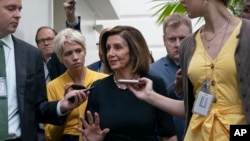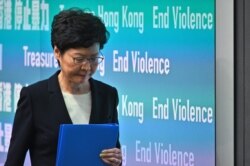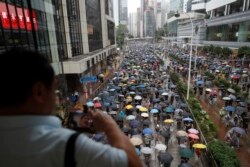A party-backed nationalistic tabloid in China has pointed fingers at U.S. House Speaker Nancy Pelosi, calling her a "vicious" politician who intends to prolong the political turmoil in Hong Kong.
In a sharply-worded editorial, titled “black-clad Western puppets continue rampage amid Hong Kong anti-mask law,” the Global Times on Monday blamed western politicians like Pelosi, who it said have played a sinister role and resorted to the methods, “designed to create more violence and unrest throughout the city.”
The government mouthpiece then threw support behind the city’s chief executive Carrie Lam, arguing that her decisions to introduce the mask ban is neither a threat to Hong Kongers' freedom of expression nor peaceful assembly. Instead, the move was “meant to reduce the level of violence and restore order by upholding the interests of the general public.”
Analysts, however, say the ban has not only backfired in the short run, but also demonstrated how poor Lam’s leadership has been.
Poor leadership
“I don’t think there’s any doubt that she is a disaster as a leader. And that’s pretty obvious,” said David Zweig, chair professor of social science at Hong Kong University of Science and Technology.
“One of the things that political scientists often do not discuss is really bad or weak leadership. But she’s a really weak leader and, I mean, that bad leadership created this problem.”
Knowing that her job is on the line, Lam has to soon concoct a solution to end the city’s anti-government protests, according to the professor.
Just a week ago, Lam was having direct dialogues with citizens and admitting how disconnected her administration has been during a community meeting.
But to many’s surprise, shortly after she returned from China’s National Day celebrations, her solution to the city’s unrest was the mask ban, effective at the dawn of Saturday.
Increased violence
Over the weekend, the city’s level of violence ended up escalating as herds of protestors defied the ban.
Professor Zweig said that the ban isn’t such a crazy idea in a well-functioning civil society, but it is so ill-timed in today’s Hong Kong that it only turns protestors even angrier and more violent.
Making things worse, Lam appears to have not thought it through for it’s impossible to enforce such a ban in a city, where many wear masks to protest against pollution or infection. That is why words on the streets recently had it that the police were told not to enforce the ban.
Zweig, moreover, disagreed with the state media’s editorial, which shifts the blame to non-existent foreign involvement in the city’s chaos.
Domestic nationalism
Through such editorials, China is building narratives to fuel domestic nationalism, he said.
“It’s important for internal consumption in China to say that this is foreign interference because that hits straight at the patriotism and nationalism of people in China. And therefore, immediately, they don’t even have to try to understand what’ s going on in Hong Kong,” he said.
On Weibo, China’s Twitter-like microblogging site, there were only several reposts of the editorial and comments. One user wrote “now that the mask ban is imposed, there won’t be any hitting attacks” and another commented “I believe the concept of family and nation is deeply-rooted in each and every Hong Konger. All we need to do is to inspire them and dig it out.”
Professor Zweig, however, warned that the U.S. is facing a dilemma. Once approved and enacted, the Hong Kong Human Rights and Democracy Act will constitute what Beijing claims is foreign interference in the former British colony. But without it, there lack external forces to pressure Beijing into easing its controls over the city.
A dilemma
He said that the Chinese government’s strategies in Hong Kong remain to patiently wait it out or “let the revolution eats its own” an observation Yang Kai-huang, head of Ming Chuan University's Cross-Strait Research Center, agreed with
Yang said, unlike western democracies, public opinion rarely plays a role in the Communist Chinese leadership’s policy-making process.
“It [Beijing] will remain on its main course of action, or the direction which it believes is right. It will coordinate among those who have any misunderstanding or struggles. But there’s no such thing that [Beijing] will admit its own mistakes simply because you have misunderstood,” Yang said.






